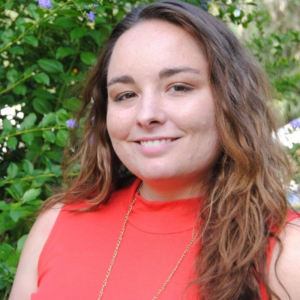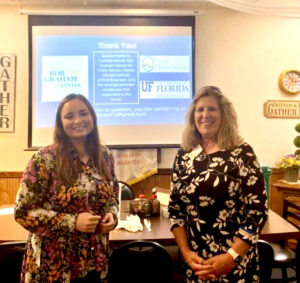By Lacey Lingelbach, Florida Climate Institute
Over the past few months, I have been talking with groups of people in small-town North Florida about the effects of climate change and how they might get involved in resiliency efforts. Despite the perception that many rural residents are climate-change deniers, my interactions revealed a surprising awareness and interest in this critical issue.
As an environmental science student at the University of Florida, I wrote my undergraduate thesis on ways to overcome climate planning challenges in rural inland Florida. My two main research findings were: 1) Rural attitudes toward climate change and environmental conservation are misunderstood, and 2) Rural Florida is often excluded and ignored in climate conversations.

To better understand perspectives, share information and expand the conversation, I embarked on what I call my Florida Climate Roadshow. I reached out to community-based organizations — Rotary Clubs, Kiwanis Clubs and Chambers of Commerce — across North Florida.
I wondered how many would agree to meet with me because of the political divide on climate change. To my surprise, many were interested. From mid-April to the beginning of July, I made presentations to 14 groups — from Hamilton County to Marion County, and from Leon County to Putnam County.
Along the way, I discovered the charm of rural Florida with its wildflowers, farmlands and historic buildings. On arriving at a meeting place or on a Zoom call, we would share stories about our backgrounds and lives.
During my 15-minute TED-talk style presentation, I would review county-level and regional climate trends and impacts, acknowledge the power of community groups in the climate fight and discuss actions to address climate change locally. I tailored each presentation to include local details and examples.

At the end of each presentation, I would encourage discussion. A few included hard-hitting questions and comments about the financial investment of climate solutions, who is to blame and the validity of the science. But I was never disrespected by those uncertain about the issue. I found there is common ground on protecting our environment.
Crescent City Rotarians talked about changing lake levels and algal blooms, and their relation to precipitation events and extreme heat. In Dixie County and Ocala, groups discussed recent infrastructure challenges from flooding and runoff. At the Hamilton County Chamber of Commerce, board members explained how disempowered rural counties feel about the Valdosta sewage spill issue.
I was encouraged by the interests of my audience as they asked questions, such as: What does adapting to changes in the climate actually look like? What can I do as a business owner to prepare for extreme weather impacts? How do I talk about climate change to those in my community who deny it?
Talking about climate change can leave people feeling overwhelmed. But I came away from my roadshow with one significant feeling — hopefulness.
I learned there is not much difference between rural Floridians and this city girl. Both of us recognize the importance of saving and conserving the environment; the impact of extreme weather events on our environmental, economic and social well-being; and the power we have as individuals and community groups to make a difference.
My big takeaway is that rural communities are an important part of Florida’s history and future and that to protect our beautiful peninsula from the changing climate, rural Floridians must be better included in the climate conversation.
Lacey Lingelbach, of Hobe Sound, is a Florida Student Climate Fellow for the Florida Climate Institute and Askew Scholar for UF’s Bob Graham Center for Public Service, having graduated from UF this past spring.
“The Invading Sea” is the opinion arm of the Florida Climate Reporting Network, a collaborative of news organizations across the state focusing on the threats posed by the warming climate.




Lacey has done very commendable and much neglected outreach. She’s shown that perceived barriers to climate action are possibly not even there, and has overcome what barriers that indeed exist. Thank you Lacey